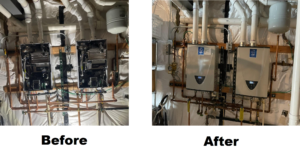
What is a tankless water heater?
A tankless water heater can be defined as demand-type, expeditious or instantaneous, providing water whenever needed. Hot water is necessary during a bath or shower, and a water heater is compulsory to provide hot water. The old-school tank water heater can take up to 17 square feet of space in a house, is not very efficient for saving energy or cost, and only stores water from 7.5 to 15.5 liters. Whether a tankless water heater is more energy-efficient, cost-effective, long-lasting, dependable, does not take up a lot of space and is expeditious, as it does not store water.
How does it work?
A tankless water heater heats water without storing water in a water tank. When someone opens a tap, the water which flows through the tap comes in touch with a heat exchanger in the unit. A natural gas burner or an electric element heats the heat exchanger, and as a result, a tankless water heater provides a constant hot water supply.
Usually, a tankless water heater provides 7.5 to 15.5 liters of water in a minute, which is supposedly 2 to 5 gallons. An electric tankless water heater cannot fulfill a large family’s need for hot water, whether a gas-burner tankless water heater can. However, sometimes it can not provide enough hot water if a family is using too much water simultaneously; for instance, taking a shower and doing household chores at the same time that need water. In that case, installing more than one water heater in separate places like the kitchen and bathroom where water usage is higher can be beneficial. However, it can cost more and may not be worth it.
Advantages and Disadvantages
Tankless water heaters are cost-effective and energy effective. They provide instant hot water whenever needed. They can save from 24% to 34% energy for a family that uses 40 or fewer gallons of water and 8% to 12% for a family that uses hot water like 80 gallons. Most tankless water heaters can last for 20 years in contrast to storage water heaters, which last for 10 to 15 years. These heaters save space and can weigh between 70 to 80 pounds, installable on the wall, which means more floor space remains. These heaters are sustainable and environmentally friendly as they prevent greenhouse gas releases.
However, these can cause some problems like mineral build-up, system overload, sudden provision of cold water, blocked air supply, ignition failure, flame failure, etc., depending on the water usage in a family. These problems are readily soluble.
To conclude, a tankless water heater is an excellent investment for a place where hot water is needed immediately. It is highly efficient, low-maintenance, saves money and energy, is environmentally friendly, and the problems are readily soluble.
LOOKING FOR A HOT WATER SOLUTION OR TANKLESS WATER HEATER REPAIR?






Leave a Reply
Want to join the discussion?Feel free to contribute!